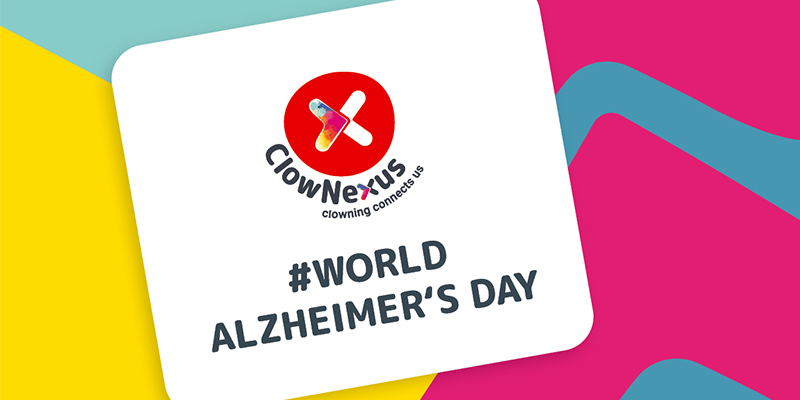“You can see the impact of the visits from clown doctors immediately”
The European ClowNexus project aims to expand the possibilities of the art of clowning to embrace seniors with dementia and children with autism spectrum disorder.
Today, symbolically, on World Alzheimer’s Day, we are talking to psychologist Jurgita Dečiunienė from Lithuania about Alzheimer’s disease, dementia and the impact of clown doctor rounds. Maybe a smile is that unique tool capable of brightening our routines?
Jurgita, for over four years now you have been specializing in health psychology, tell us about your experience of working with seniors with neurodegenerative diseases. What cases did you encounter?
I worked at a social care institution for three years. Some of the residents of the institution were diagnosed with neurodegenerative diseases, such as Alzheimer’s, Parkinson’s disease or vascular dementia. During this time I came across a variety of situations – from people who at first sight perfectly adapted to their limitations and lived a fully-fledged life, to serious cases – where people completely depended on the help from others, were unable to maintain a conversation and contact with them was very limited.

Psychologist Jurgita Dečiunienė
Today we mark World Alzheimer’s Day. Many would ask what the relationship between Alzheimer’s disease and dementia is?
If a person is diagnosed with dementia, it may not necessarily be Alzheimer’s disease, but if a person is diagnosed with Alzheimer’s disease, dementia is always also confirmed. Signs of dementia may be more pronounced in some people and less in others.
Can you tell about the symptoms of dementia?
Dementia is primarily an impairment of cognitive abilities. However, in each person it may manifest individually. The main signs of dementia are decline of short-term memory, attention, and orientation in time and place accompanied by various emotional experiences. For example, many of us have been in a situation when we forget where we placed things. However, a person suffering from dementia may not only forget where he has placed a particular thing, but look for something from his past that no longer exists. When relatives or carers try to tell such person that the thing no longer exists, he may get angry, feel misunderstood, think he is being lied to, may become suspicious and restless. In such situations, one can see the lack of judgement with respect to their own situation.
As a rule, when we can’t find something, we think that we are just absent minded, but a person with dementia may be sure that he remembers perfectly well that he has recently had the thing. If a person’s judgment has not declined, he may realise that he forgets things too often and may get confused and depressed. He may then suffer from sadness, despair and anxiety. Frequent changes in psychological and emotional state are also characteristic to dementia. One moment, a person can be calm, cheerful, curious, and the other moment – he is excited and restless. This may vary from day to day or even hour to hour.
While working in the social care institution, you regularly came across clown doctors. Can you share your observations as to what impact their visits have on seniors with dementia?
Visits of clown doctors bring positive emotions to seniors, make them feel important and relate to others, which otherwise may be extremely difficult. I remember one resident in the care institution, who, because of his condition, was no longer able to take care of himself, and it was extremely difficult to communicate with him. It was not easy to understand why it was so difficult to talk to him – whether it was due to poor hearing or because of the decline in cognition.
At that time we had a lockdown, so clown doctors visited seniors remotely via a video call. I was anxious about how he would respond to clown doctors. To my surprise that person easily got involved in singing and dancing with the clown doctors. Clown doctors have a few tricks up their sleeves to approach seniors with dementia, who at first sight may seem introvert and isolated.
In this particular case, the trick was singing. You can see the impact of the visits from clown doctors immediately – the mood of seniors changes, they become invigorated, more cheerful, energetic, and it doesn’t matter if it lasts only a few minutes – this is a long period of time considering the limitations of people with dementia.
How, in your opinion, can visits and humour from clown doctors improve everyday life of seniors with dementia?
Laughter and humour resulting from the relationship, not only provide pleasure and good mood, but also allow you to feel connected with another person. People with dementia or Alzheimer’s may eventually become withdrawn and apathetic. They seem to be self-absorbed and may find it difficult to initiate communication. If the disease has advanced, a person may not even understand his need to be in the relationship, so the initiative of people around them is very important. By visiting seniors in care institutions, clown doctors are able to create a cosy, warm atmosphere, to engage people and help them be in the relationship.
Another thing of such encounters is spontaneity. There is less and less spontaneity in the life of people with dementia. On the one hand, this helps them feel safer, calmer, on the other hand, people are less likely to be playful, curious, engaged. Thanks to the clown doctors, there is more playfulness and vigour in the life of seniors. At least at that moment, they can experience pleasant emotions and have other experiences, which they are otherwise unable to initiate because of their condition.
How can people around persons with dementia or Alzheimer’s or their relatives help them?
In order to facilitate or maintain a stable condition, regular routine, adapted environment, satisfaction of basic needs, social contacts, and empowerment of persons with dementia or Alzheimer’s can help. When the environment is adapted (each thing has its own place, physical security is ensured) and there is an established routine (what and when the person does in the day), people do not need to make additional efforts in making decisions or finding their way around.
Responding to basic needs can help maintain a relatively stable emotional condition of persons with dementia. In the advanced stages of the disease, a person may find it difficult to understand whether he is hungry, cold or tired. If a person is hungry or tired, he may feel irritated, restless, so it is important to take care of such basic needs. Another important point is respectful communication.
This allows a person to experience pleasant emotions such as community, joy, curiosity, relaxation, and to maintain dignity, feel important and valued. In order to strengthen cognitive abilities or to slow down the progression of Alzheimer’s disease, it is possible to engage in activities that stimulate memory and concentration, like solving crossword puzzles, jigsaw puzzles, discussing books or articles. However, it is important to remember that no matter how much we will help seniors with neurodegenerative diseases, there is only so much we can do and we must try to accept both the current condition of seniors and our limitations.
*The International ClowNexus project is co-funded by the EU as part of the Creative Europe programme. More information about the project https://clownexus.eu/





Recent Comments